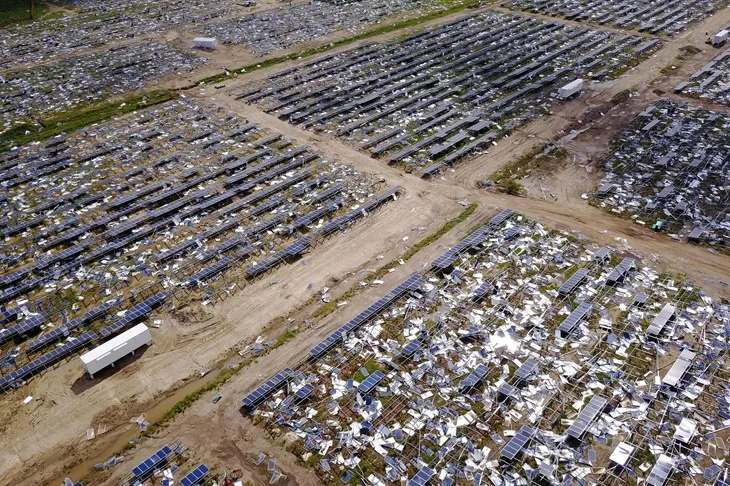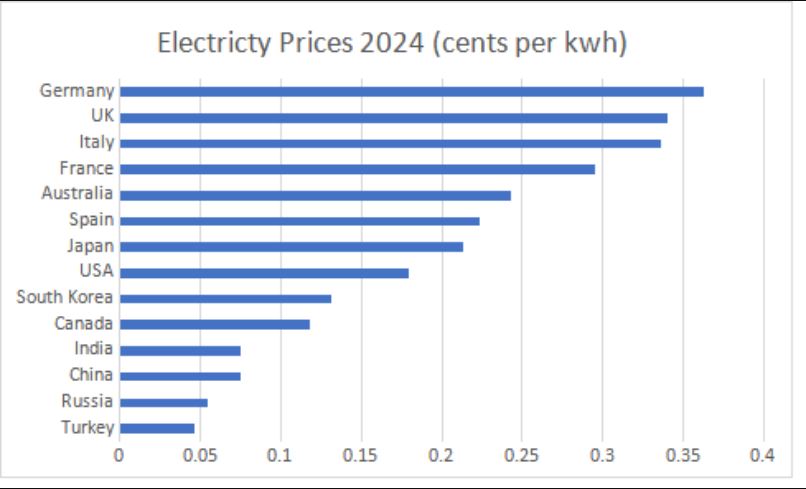
Originally published in The Spectator, January 2025

‘To rescue our economy,’ Trump signed day-one orders ‘to end all Biden restrictions on energy production, terminate his insane electric vehicle mandate, cancel his natural gas export ban, reopen ANWR in Alaska (the biggest site potentially anywhere in the world), and declare a national energy emergency.’
Trump terminated Biden’s Green New Deal, pulled out of the Paris Accord, and castigated the Davos elitists who could do nothing more than acquiesce in his triumphant procession. Among the measures is a freeze on $280 billion for green energy ($50 billion was already committed) said to have ‘a very negative effect’.
Renew Economy, the green energy industry’s house journal, reports views ranging from defeatist to those hoping that procedural issues will slow down Trump’s intended dismantling of the subsidies that are the industry’s lifeblood.
The Wall Street Journal has declared ‘climate change ideology is dying’ and the corporate world is reacting. Woodside has abandoned its green energy projects in Australia and Oklahoma. Rio Tinto praised the Australian government for its subsidy scheme to compensate aluminium smelters as they transition to renewable energy by 2036. This follows similar retreats from renewables announced by BP, Shell and big banks.
Labor is moving in the opposite direction from Trump in announcing a further $2 billion in green subsidies through the Clean Energy Finance Corporation. Peter Dutton, while not setting 2035 emission reduction targets, refuses to follow Trump in abandoning Net Zero. He claims that doing so would harm trade and employment. It is hard to see trade being affected when the EU is the only jurisdiction still contemplating – and not for long – any action penalising carbon-intensive imports. As for employment, Dutton should get some better advice and be informed that any jobs in building renewables are far more than offset by jobs lost as a result of their intrinsically higher costs and lower reliability.
Labor is also providing $2 billion to the nation’s four aluminium smelters conditional on them greening their energy; this comes on top of existing subsidies for them to get cheap coal-generated electricity. The aluminium smelter subsidy stems from Albanese’s recognition that more than doubling energy costs in a business that has energy comprising a third of total costs means sudden death. He is gambling on the mirage of an unattainable breakthrough that would see wind/solar costs eventually falling below those of coal, gas and nuclear.
But the focus on aluminium also demonstrates his misunderstanding about how market capitalism works. Mr Albanese rejects compensation for steel and cement where energy costs are 10-15 per cent of total costs, judging that they can absorb the costs. And so they might, until the firms’ ‘fixed’ capital needs replacement. When it does, the replacement decision is in the hands of the shareholder, the residual beneficiaries, who get paid only after everyone else has been recompensed. If equity shares comprise 40 per cent of a firm’s capital and capital constitutes 20 per cent of total costs, shareholders who formerly got 8 per cent of the products’ value make losses where energy costs are doubled.
Even when energy costs are only 3 per cent of total costs, the arithmetic leaves the equity holder with 3/8ths less profit, bringing tremendous incentives to shareholders, (including superannuation funds) to find alternative locations.
The capitalist system is remorseless in pursuit of profit and it is this that drives efficiency. Mr Albanese has spent his life railing against that system and has never understood how it has driven our present living standards – and how rejecting the system for the top-down planning he favours has brought poverty to Cuba, Venezuela, and other failed states and is seriously reducing living standards in Australia, Germany, the UK and other nations that have gone the Full Monty on replacing hydrocarbon fuels with renewables. The outcome in energy prices is indisputable.

Of course, if the whole world were to follow a decarbonisation agenda, while serious losses would follow, they would be spread across all nations. As it stands, Australia in joining the EU and UK in a climate crusade, confronts the 80 per cent of the world economy, now including the US as well as China and India, that has backed away from seriously subsidising renewables. Those nations now have a considerable comparative advantage and it is the climate crusaders’ economies that are being nailed to the cross.
Under Peter Dutton, the Liberal Party is avoiding the sort of radical deviation from the Woke dirigiste policies that had, pre-Trump, become the conventional approach of mainstream conservatives. This may be enough to win power but it would hardly justify a claim of a mandate for the change required. Other Anglosphere politicians – Poilievre in Canada and Farage (and arguably Badenoch) in the UK – like Trump, have confronted socialistic policies boldly and persuasively. This has been accompanied by both greater enthusiasm from their base support and decisive leads in public opinion.